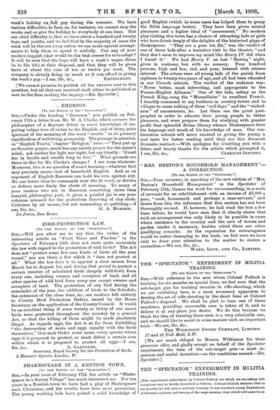EMERSON.
[To THE EDITOR or THE " SPECTATOR." J
SIR,—Under the heading " Emerson " you publish on Feb- ruary 17th a letter from Mr. W. A. Clarke, which accuses the philosopher of a flagrant defect in exact knowledge, of im- puting vulgar love of riches to the English, and of being quite ignorant of the meaning of the word " wealth " in its primary signification of well-being, prosperity. The passage in question, in "English Tracts," chapter "Religion," runs :—" They put up no Socratic prayer, much less any saintly prayer for the queen's mind ; ask neither for light nor right, but say bluntly: Grant her in health and wealth long to live.'" What grounds are there in this for Mr. Clarke's charges ? I see none whatever. Moreover, this is no question of exact learning—whatever that may precisely mean—but of household English. And as an exponent of English Emerson can hold his own against any. No one better than he commands ever the fit word, or divides or defines more finely the shade of meaning. To many of your readers who see in Emerson something more than essayist, philosopher, poet, it gives a painful jar to see your columns misused for the gratuitous throwing of clay clods. Criticism by all means, but not misreading or quibbling.—I














































 Previous page
Previous page